________________
218
NYAYA AND JAINA EPISTEMOLOGY
negation to positive entity is in keeping with its realistic position. Jaina view of negation is also realistic in so far as negation is significant negation in Jainism. Nyāya position is rather hyper-realistic when it recognizes independent existence of it. Jain view is more in keeping with its nonabsolutism when it holds negation as one of the aspects of reality. As regards the import of words bith hold realistic position though Jainism is more consistently realistic. Both recognize different ways of knowing. Thus, to the epistemological question whether our cognition is capable of knowing the world, Nyāya and Jaina realism contrary to idealism maintain that world is objectively given and that its laws can be known. But it is Jaina realism with its doctrine of Anekāntavāda and resulting methods of Syādvāda and Nayavāda which could give an adequate logical basis to realistic epistemology. The essentially realistic position of Jaina logic is obvious when it maintains that existents are multiform and their infinite number of characteristics can be discovered by experience alone and not created by mind. Further Jainas are relativists because of their anti-absolutist attitude. And yet, standpointism or perspectivism of Jainas has no subjective basis but is grounded upon objective data of experience. Though it seems to support dynamism of human subjectivity, it does not end into subjectivism.
Epistemologically, the peculiar features of Jaina realism
are:
i. It is based on experience. Jaina logic is essentially empirical as distinguished from a priori.
ii. It asserts that a thing is capable of different predications according to limitations imposed by objective differences of substance, time, space and attribute.




